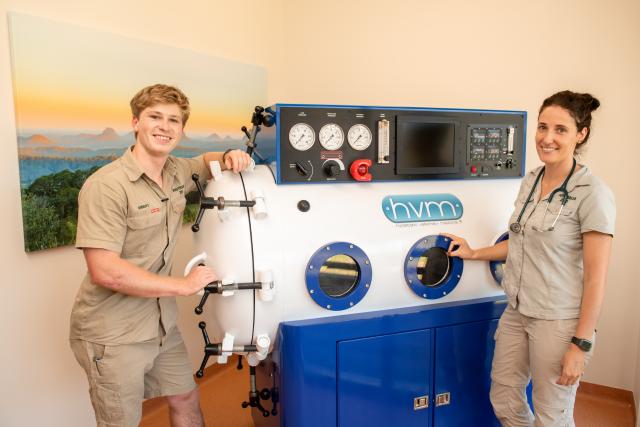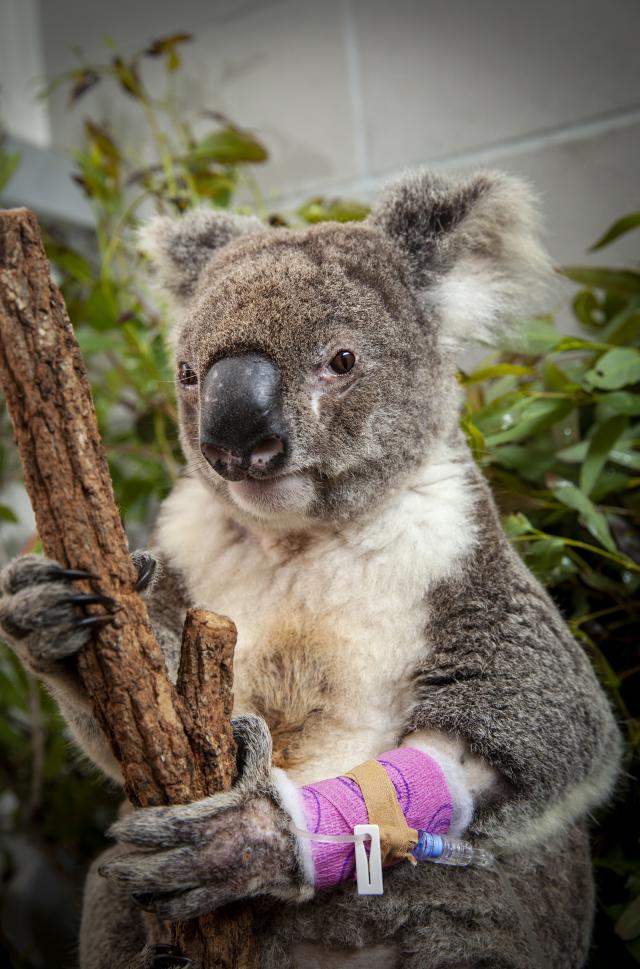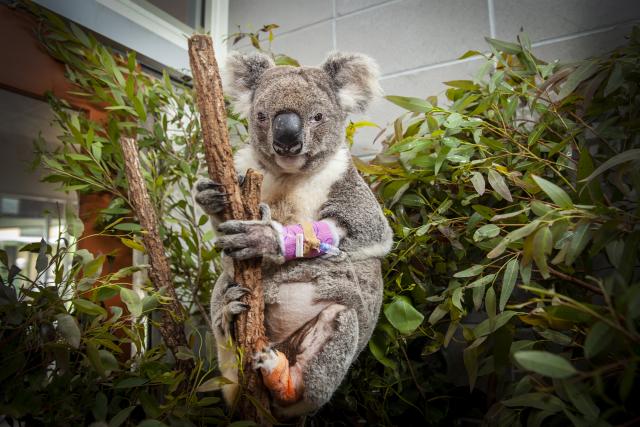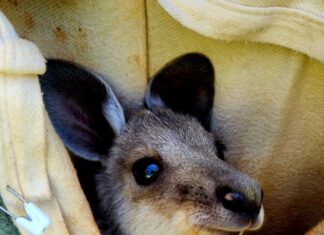The Australia Zoo Wildlife Hospital is currently in Trauma Season, receiving an influx of sick, injured and orphaned native animals for lifesaving treatment and care, treating more than 200 patients a week.
The busiest and most confronting time of the year, Trauma Season begins as weather heats up in Australia and wildlife is on the move, with patient admissions almost tripled.
Animals are on the lookout for water or a mate, and young ones are beginning to explore, leading to the crossing of busy roads either on foot or overhead. Often, this is a challenging and dangerous time for wildlife in our increasingly man-made world.
Donald is a koala who was found near a fuel station in Doonan after being hit by a car.
He suffered from severe face and neurological trauma, and a fracture to his left foot causing him to limp while attempting to walk or climb.
Wildlife conservationist Terri Irwin said, “The primary causes of koala admittance at the Australia Zoo Wildlife Hospital are vehicle strikes, along with disease and domestic pet attacks. Since the start of Trauma Season, we’ve received 146 koalas in just six weeks, which is a grim reality of how tough these beautiful animals have it in the wild.“
“Our Wildlife Hospital is playing a pivotal role in koala conservation to protect animals like Donald. The incredible veterinary team goes above and beyond to rehabilitate each animal, no matter how big or small, with the goal of releasing them back in the wild where they belong,“ Terri said.
RACQ principal technical researcher Andrew Kirk said RACQ received 11,134 insurance claims for vehicle collisions with animals in the past three years.
“We tend to see an uptick in car and animal collisions during spring breeding season when animals are on the move,” Mr Kirk said.
“Wildlife can be highly unpredictable, especially when caught in headlights, exposed to loud noises like horns or confused by fast-moving vehicles.
“Colliding with an animal can cause significant damage to your vehicle and not only harm or kill the animal, but potentially put you and your passengers at risk of being injured in the crash.
“Drivers should be extra vigilant, particularly around dusk and dawn when animals are more likely to be active. If you can’t avoid driving at these times, make sure you always stick to the speed limit, use high beam headlights where appropriate and never to swerve to avoid hitting an animal.
“Erratic manoeuvres can put you at greater risk of causing a collision with another vehicle or roadside obstacle. If it’s safe, try to brake or pull over, and call for help if you have struck an animal.”
Donald the koala is being treated with pain relief and fluids at the Wildlife Hospital to help improve his health. He underwent surgery on his foot to treat the injuries associated with his fracture, and is receiving specialised treatment for head trauma.
Donald is also receiving specialised treatment in the state-of-the-art hyperbaric chamber, situated in the Wildlife Hospital’s new ICU Unit, the Perry MacFarlane Intensive Care Ward. Donated by the Hyperbaric Veterinary Medicine (HVM), the hyperbaric chamber is used to increase the speed of healing by increasing global tissue oxygenation in the patient.
“Donald has had four sessions in the hyperbaric chamber so far, and has improved wonderfully since, especially with his head trauma. When he first arrived, he was unable to climb a tree, but that changed after his first session as Donald climbed up the tree to eat his eucalyptus leaves.
“We are hopeful that this sweet boy recovers and can return back to his natural habitat,“ Terri said.
Koalas are now classed as endangered across Queensland, NSW and the Australian Capital Territory. The Australia Zoo Wildlife Hospital has treated over 10,000 koalas since opening its doors in 2004, giving these iconic animals a second chance to survive in the wild.
The Australia Zoo Wildlife Hospital operates 24 hours a day, seven days a week, and treats thousands of sick, injured and orphaned native wildlife, having treated over 115,000 animals since opening its doors.
This Trauma Season, it is encouraged to slow down on the roads at dawn and dusk, to secure your pets safely at night, and to contact your local rescue group to help an animal in need.
To support the efforts of the Australia Zoo Wildlife Hospital this Trauma Season, visit wildlifewarriors.org.au
RACQ supports the Australia Zoo Wildlife Hospital by providing the two animal ambulance vehicles for their Rescue Unit, and covering associated costs like maintenance, registration and insurance.











